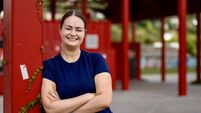Maintain your fitness and muscle strength for healthy aging

Resistance training is the most effective way to build and strengthen muscles at all ages. This means doing things like lifting free weights like dumbbells, using machine weights, resistance bands or bodyweight exercises such as push-ups and squats
Earlier this year, the RTÉ documentary lifted the nation’s spirits when it showcased septuagenarians and octogenarians dancing, swimming, boxing, running and rowing — living their best lives by maintaining fitness and muscle strength.
Dublin taxi driver and former comedian, Tom Reeves (83) dons his boxing gloves and hits a punchbag in his shed each day.











